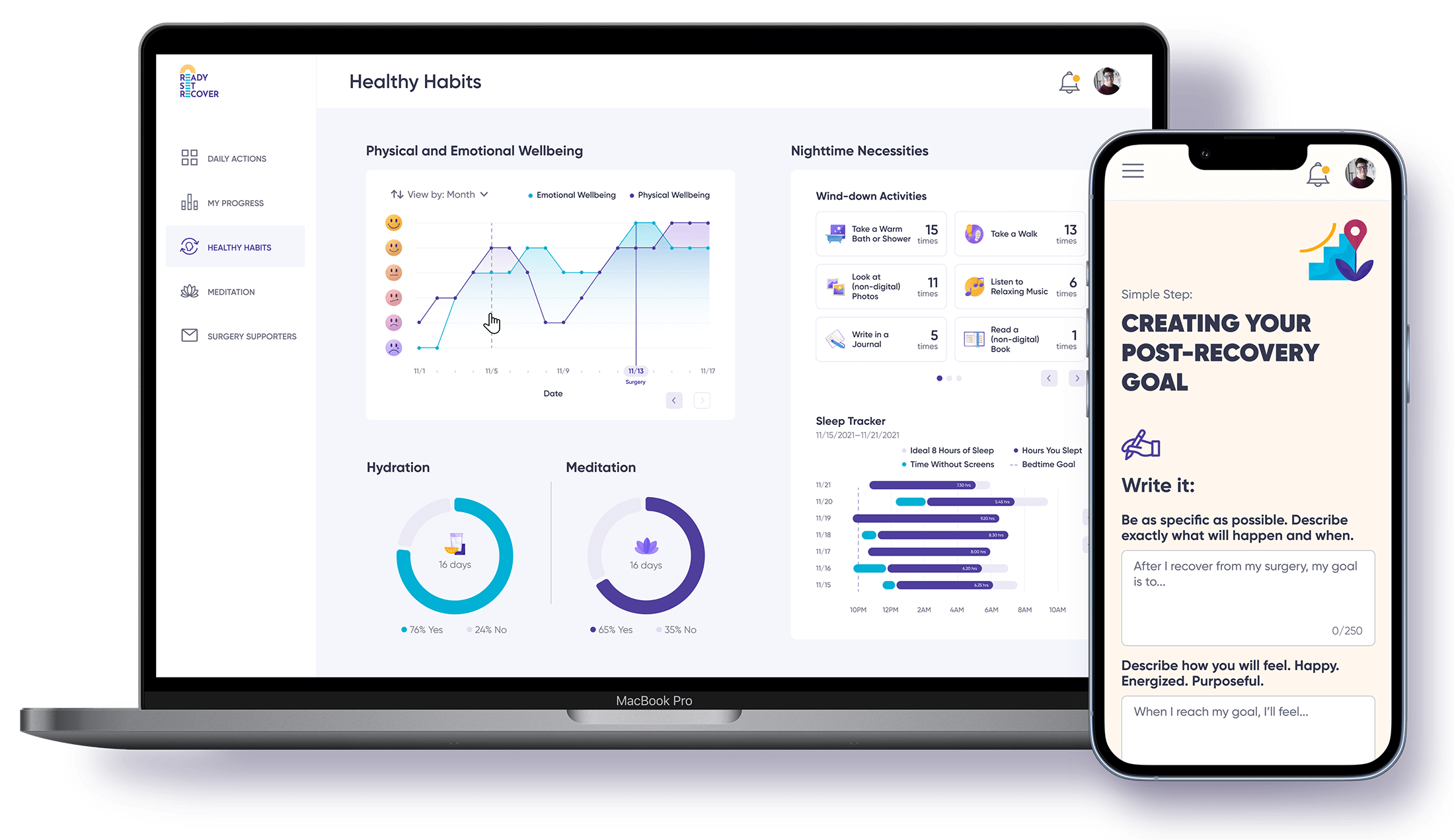After-Surgery Depression: Causes, Symptoms & Coping Strategies


A Story
Recently, a good friend had a serious e-bike accident, fracturing his hip and requiring surgery. Titanium rods became part of his anatomy, a testament to the severity of his injury. I stumbled upon the news on social media, and reached out immediately. But there was silence.
I sent repeated texts. Nothing. Fast forward about 6-8 weeks and we finally spoke. He apologized for not responding. He was home alone, unable to move and he’s normally a pretty active guy, so he was very concerned he wouldn’t be able to be his normal self. Consequently, due to the emotional stress, he was in no mood to talk. The man who thrived on movement was now wrestling with an extremely common silent opponent: post-surgery depression.
Thankfully, he’s on the mend, doing PT and his surgeon thinks he’ll get back to 100%. But this story isn’t just about my friend; it exemplifies the potentially challenging time for anyone after surgery. It’s a reminder that while our bodies heal, our minds need care too. Engaging with community, leaning on emotional support, or simply asking for help with daily tasks can be transformative. Be prepared, not just for the physical challenges of recovery, but for the emotional ones too. And remember, even in solitude, you’re not alone.
Depression after surgery can be an unexpected challenge faced by many patients. The road to recovery can be filled with emotional ups and downs as the body and mind adjust to the surgical experience. Understanding post-surgery depression, its causes, symptoms, and how to cope with it effectively can make a significant difference in your recovery journey.
Recognizing Post-Surgery Depression

Post-surgical depression is a situational depression that can occur after any invasive surgery. Research suggest it affects more than 10% of patients. It’s characterized by a persistent feeling of sadness and hopelessness that may arise after an operation, highlighting the psychological impact of such procedures. Proper treatment and recovery hinge upon the early identification of signs and symptoms, especially in individuals predisposed to depression post-surgery.
Identifying Symptoms
The symptoms of post-surgical depression can include
Persistent feelings of sadness or hopelessness
Loss of interest in activities once enjoyed
Changes in appetite or weight
Difficulty sleeping or sleeping too much
Fatigue or lack of energy
Difficulty concentrating or making decisions
Feelings of guilt or worthlessness• Physical illness such as headaches or stomach aches
Differentiating from Normal Recovery
Distinguishing between normal recovery and post-surgical depression can sometimes be a complex task, as the two can share similar symptoms. However, paying close attention to the persistence, severity, and duration of symptoms can aid in making an accurate diagnosis. Post-surgery depression can last for several weeks to months, differing vastly from the typical recovery discomfort that usually subsides as the body heals. This highlights the importance of emotional recovery as a distinct aspect of the healing process.
Key indicators of post-surgery depression include:
Persistent low mood or feelings of sadness
A marked decrease in interest or pleasure in activities usually enjoyed
Reactions to pain medications, such as increased feelings of sadness or anxiety
Persistent worries about the pace of recovery, despite reassurances from healthcare providers
Surgery-related fear or anxiety that doesn’t lessen over time
Confronting one’s own mortality, especially if this leads to feelings of hopelessness or despair
By being vigilant about these signs, patients and healthcare providers can collaborate effectively to manage post-surgery depression, ensuring a successful surgical outcome and recovery.
Causes and Risk Factors
Postoperative depression can be attributed to various factors, the most common of which are:
Physical factors such as pre-existing conditions, complications and medication reactions
Emotional stressors affecting emotional health, like worries about complications and limitations during recovery
Personal factors and susceptibility
Let’s take a look at each of these in a little more depth:
Physical Factors
Physical factors contributing to post-surgery depression include:
Pre-existing conditions: These can include any chronic diseases or health conditions that a patient might already have before the surgery. These conditions might make it harder for the body to recover after surgery, leading to feelings of despair and depression.
Illnesses: If a patient falls ill during or after the surgery, it can delay recovery and increase feelings of frustration and sadness. This is especially true if the illness is severe or long-lasting.
Injuries: Any injuries sustained during the surgery or during the recovery process can also contribute to post-surgery depression. This is because injuries can prolong the recovery process and make it more difficult, leading to feelings of hopelessness.
Medication side effects: Certain medications used during surgery or prescribed for pain relief after surgery can have side effects that include depression and emotional distress. These medications can affect the brain’s chemistry and lead to mood changes, including feelings of sadness.
Emotional Stressors
Emotional stressors can greatly intensify the symptoms of depression after a surgery. These stressors can range from anxiety about the surgery itself, confronting one’s own mortality, worries about the rate of recovery, to apprehension about the surgery’s outcome. All of these factors can contribute to post-surgery depression.
The recovery period after the surgery can also present significant emotional challenges. The physical pain and discomfort, the limitations in mobility, and the dependency on others for assistance can lead to feelings of helplessness and frustration. The slow and often difficult recovery process can also lead to a sense of impatience and dissatisfaction, further contributing to the feelings of depression.
The long-term implications of the surgery can also be a source of emotional stress. The potential changes in lifestyle, the possible need for ongoing medical care, and the fear of recurrence or complications can all lead to a psychological downward spiral.
Lastly, isolation after surgery can have a negative impact on the patient’s emotional state. This can lead to increased levels of depression, anxiety, anger, and loneliness. Recognizing these emotional stressors and seeking support from friends, family, or healthcare providers can be an effective way to manage post-surgical depression. We’ll touch on this more, later.
Personal Factors and Susceptibility
Personal factors and susceptibility to depression play a substantial role in the likelihood of experiencing post-surgery depression. These factors can be broadly categorized into psychological factors, lifestyle factors, and genetic predisposition. Individuals who have previously experienced depression are more susceptible to post-surgery depression, as the stress and emotional strain of surgery can trigger a recurrence. Emotional resilience, or the ability to adapt to stressful situations, can significantly impact one's vulnerability to post-surgery depression.
Psychological Factors
Psychological factors such as a history of depression or other mental health disorders significantly increase the risk of post-surgery depression. Individuals who have previously experienced depression are more susceptible to post-surgery depression, as the stress and emotional strain of surgery can trigger a recurrence.
Moreover, individuals with a high level of preoperative anxiety or stress are also at an increased risk. The fear and uncertainty surrounding surgery can exacerbate feelings of anxiety, which in turn can lead to depression.
Lifestyle Factors
Lifestyle factors such as lack of social support, substance abuse, and chronic stress can also contribute to post-surgery depression. Lack of social support can lead to feelings of isolation and loneliness, which are known risk factors for depression. Substance abuse, particularly alcohol and drug abuse, can interfere with the recovery process and increase the risk of depression.
Chronic stress, whether related to work, financial issues, or personal relationships, can also increase susceptibility to post-surgery depression. The additional stress of surgery and recovery can elevate existing stress, leading to depression.
Genetic Predisposition
Genetic predisposition to depression can also increase the risk of post-surgery depression. Individuals with a family history of depression are more likely to experience depression themselves, including post-surgery depression. This is likely due to a combination of genetic factors and shared environmental influences.
Understanding these personal factors and susceptibility to depression can help healthcare providers identify individuals at higher risk of post-surgery depression.
Surgeries with Higher Depression Risk
Certain surgeries, such as open-heart surgery, are associated with a heightened risk of post-operative depression. This is happens for several reasons. First, the increased cardiovascular morbidity risk associated with the procedure can lead to stress and anxiety, which are known triggers for depression. In addition, the surgery itself is a major procedure that can cause significant emotional stress. The thought of having one’s heart operated on can be daunting, and the recovery process is often long and challenging, potentially leading to feelings of hopelessness or despair due to the emotional toll.
Furthermore, the physical toll of the surgery can lead to depressive symptoms. The body’s reaction to such a major procedure can involve fatigue, pain, and physical discomfort, all of which can contribute to feelings of depression.
Another aspect is the potential change in lifestyle following open-heart surgery. Patients often have to make significant changes to their diet, physical activity, and overall lifestyle, which can be difficult to adapt to and can lead to feelings of frustration or sadness.
Other major surgeries are also associate with increased risk of depression and healthcare providers ought to identify high-risk patients undergoing such procedures and offer suitable support and treatment to mitigate likelihood. This can include pre-surgery counselling, regular check-ins for postoperative pain after-surgery, and providing resources for mental health support.
The Impact of Depression on Recovery
Depression can significantly impact the recovery process after surgery. Research has shown that patients who experience depression after surgery are more likely to have a longer hospital stay, increased risk of complications, and a slower recovery. Depression can also affect a patient’s ability to manage chronic pain, leading to increased discomfort and decreased quality of life. Furthermore, depression can increase the risk of developing physical illnesses, such as cardiovascular disease and diabetes, which can further complicate the recovery process. It is essential for patients to seek help from a mental health professional if they are experiencing depressive symptoms after surgery.
Strategies for Coping with Postoperative Depression

Coping strategies for post-surgery depression include seeking professional help, building a support network, and focusing on self-care. Maintaining connections with loved ones can offer emotional support and help reduce feelings of loneliness, which can prevent one from starting to develop depression. Implementing these strategies can help individuals manage their depression, improve their overall well-being, and aid in the recovery process.
Remember, everyone’s experience with surgery is unique, and effective strategies will differ based on individual needs. By understanding the various strategies available, patients can tailor their approach to better manage their situation and enhance their recovery experience.
Seeking Professional Help
Seeking professional help for post-surgery depression involves informing your healthcare provider, who may refer you to a mental health professional or prescribe antidepressants or psychotherapy. Professional help can offer expert guidance and support in managing emotions and coping with the recovery process, as well as access to effective strategies and techniques to alleviate symptoms of depression.
Healthcare providers play a central role in diagnosing post-surgery depression and providing suitable treatment. They can:
Increase awareness of potential mental health issues
Refer patients to relevant therapeutic or pharmacological treatments
Provide emotional support
Monitor progress
If you believe you are experiencing significant depression after surgery, seeking professional help is highly advised.
Building a Support Network
As illustrated in the story at the beginning of the article, it’s understandable to not want a lot of social interaction when you’re not feeling great. However, cultivating a support network by reaching out to friends, family, and joining support groups can help alleviate depression symptoms and provide emotional support during recovery. Maintaining connections with loved ones can offer emotional support and help reduce feelings of loneliness, which can prevent one from starting to develop depression.
Joining support groups can be particularly beneficial in the battle against post-surgery depression, as they can build emotional resilience and:
Alleviate feelings of isolation: Being part of a group of individuals who are going through similar experiences can reduce feelings of loneliness and isolation. It’s comforting to know that you’re not alone in your struggles and that there are others who understand exactly what you’re going through.
Diminish distress: Sharing your experiences and hearing about others’ coping strategies can help diminish the distress associated with post-surgery depression. It’s a safe space to express your fears, frustrations, and anxieties, and receive empathetic, non-judgmental responses.
Establish a sense of belonging: Being part of a group gives you a sense of belonging, which can be incredibly comforting during challenging times. You feel part of a community that cares for and supports each other.
Acquire coping techniques: Support groups often provide practical advice and coping techniques that have worked for others. These tips can be incredibly useful in managing your own symptoms of depression.
Obtain emotional backing: The emotional support you receive from group members can be a powerful tool in combating depressive symptoms. Knowing that others are rooting for your recovery can provide a much-needed emotional boost.
Cultivate optimism for recovery: Hearing success stories from others who have successfully managed their post-surgery depression can instill hope and optimism for your own recovery. It’s a reminder that recovery is possible, and that with time and the right support, you too can overcome this challenge.
Ask your healthcare provider for information about support groups related to your situation.
Even if you decide not to join a support group, many of these benefits can be achieved by leaning on people who care about you. Plus, if they’re local, they can also help with tasks you may be unable to do easily on your own, such as a ride to the doctor, cooking a healthy meal or walking a dog. If you’re still reluctant to ask for help, just recognize it can also be an opportunity to become closer with people who want to help.
Focusing on Self-Care
Focusing on self-care during the recovery process can play a significant role in managing depression and improving emotional health after surgery. Prioritizing healthy habits such as:
Proper nutrition via a healthy diet
Exercise
Sleep
Setting realistic goals for recovery
In the case of nutrition, consuming a healthy diet can help reduce stress and enhance overall health. Eating a balanced diet rich in fruits, vegetables, lean proteins, and whole grains can provide your body with the necessary nutrients it needs to heal. Proper nutrition boosts the immune system, aids in wound healing, and can improve your mood.
Engaging in regular exercise, even in moderation, can improve mood and promote overall well-being in individuals dealing with post-surgery depression. Physical activity stimulates the production of endorphins, the body’s natural mood lifters. Even simple activities like walking or stretching can help you feel better, increase your energy levels, and speed up your recovery.
Obtaining sufficient sleep and maintaining a regular sleep schedule can also be crucial in the recovery process and management of depression. Sleep is when your body heals and regenerates. Ensuring you’re getting enough rest can help your body recover faster, reduce feelings of fatigue, and improve your mood.
Remember, while it’s important to push yourself during recovery, it’s equally important to listen to your body and give it the rest it needs. Your body has been through a lot, and it needs time to heal. By focusing on these aspects of self-care, you can help manage symptoms of post-surgery depression and pave the way for a smoother, faster recovery.
Prevention and Preparing for Surgery
Preventing and preparing for undergoing surgery entails learning about the procedure and recovery process, and honing coping skills to handle stress and emotions. Proactive measures before surgery can help patients build emotional resilience, lower their risk of developing post-surgery depression, and ensure a more streamlined recovery process.
Gaining knowledge about the surgery and recovery process, cultivating coping strategies, and assembling a support system can help minimize the risk of post-surgery depression. These measures can provide patients with a sense of control and empowerment, leading to improved overall mental well-being and quality of life during recovery.
Educating Yourself
Learning about the surgery, recovery timeline, and potential surgical complications can help reduce anxiety, support emotional health, and better prepare you for the post-operative period. Understanding the recovery timeline can improve mental health by providing a sense of progress and hope.
Having knowledge of what to expect at each stage of recovery can help individuals set achievable objectives and monitor their advancement, which can improve their disposition and enthusiasm. Furthermore, comprehending the recovery timeline can assist individuals in preparing for and anticipating potential difficulties or hindrances, diminishing sentiments of anxiety and ambiguity.
Developing Coping Skills
Coping skills, such as relaxation techniques and stress management strategies, are a crucial step to reduce the risk of developing depression after surgery. Along with maintaining social ties which we previously discussed, it's also important to cultivate habits for emotional health. This can include activities such as meditation, journaling, or simply taking time out each day to relax and do something you enjoy. These habits can help to reduce stress and improve your overall mood, making it easier to cope with the emotional challenges that can arise after surgery.
Establishing positive goals and keeping realistic expectations are also key to managing post-surgery depression. Having clear, achievable goals can provide a sense of purpose and direction, helping to keep your spirits high during the recovery process. Meanwhile, maintaining realistic expectations can prevent feelings of disappointment or frustration if your recovery doesn't progress as quickly as you'd hoped.
Stress management is another crucial component of dealing with post-surgery depression. Regular exercise, even in moderation, can help to reduce stress and improve mood. Consulting a professional, such as a psychologist or psychiatrist, can provide you with additional strategies for managing stress.
Engaging in mindfulness activities, such as yoga or meditation, can also be beneficial. These activities can help to calm the mind and reduce feelings of anxiety or distress.
Forming routines can provide a sense of structure and normalcy, which can be comforting during the often chaotic recovery period. Finally, obtaining support from family and friends can provide emotional comfort and practical assistance, making the recovery process a little easier to manage.
Managing Expectations and Emotions
Managing expectations and emotions is crucial during the recovery process. Patients should be aware that recovery is a process that takes time, and it is essential to be patient and focus on progress, not perfection. It is also important to acknowledge and express emotions, rather than suppressing them. Patients can benefit from talking to a mental healthcare provider or a therapist to manage their emotions and develop coping strategies. Additionally, patients should be aware of the risk factors for depression after surgery, such as bariatric surgery or knee replacement surgery, and take proactive steps to manage their mental health.
Focusing on Rest and Recovery
Focusing on rest and recovery is essential during the post-surgery period. Patients should prioritize rest and avoid overexertion, as this can exacerbate depressive symptoms and prolong recovery. Patients should also focus on relaxation techniques, such as deep breathing, meditation, or yoga, to manage stress and anxiety. Additionally, patients should be aware of the signs of post-surgical complications, such as infection or bleeding, and seek medical attention immediately if they experience any unusual symptoms. By prioritizing rest and recovery, patients can promote a successful surgery outcome and reduce the risk of post-surgical depression.
Summary

Post-surgery depression is a prevalent and often overlooked aspect of the recovery process. Recognizing the signs, understanding the causes and risk factors, and employing effective coping strategies can significantly improve the recovery journey for those affected by post-surgery depression.
By educating yourself, developing coping skills, and if necessary, seeking professional help, you can take control of your mental health after surgery and ensure a smoother, more positive recovery experience. Remember, you are not alone in this journey, and reaching out for help and support is a crucial step towards healing and regaining your well-being.
Getting back to my friend... I told him I understood not wanting to reach out when he was feeling lousy, but at the same time, hearing from people who care about you can also be tremendously uplifting. And when you feel better mentally, you heal better physically. He laughed and asked if I just came up with that. I said I did...and that I planned on using it again.
If you need some help going through the challenges of surgery, we encourage you take a look at Ready Set Recover. You'll be given a framework to help with many of the topics covered here, including what to discuss with your surgeon, asking others for help, and developing healthy habits to help reduce stress.
Related Articles:
Frequently Asked Questions
How long does post surgery depression last?
Depression following surgery is common and can last up to one year, impacting emotional health. It is associated with decreased quality of life and increased mortality.
Can surgery cause emotional trauma?
Yes, surgery can cause emotional trauma and emotional distress. It is an invasion of the body which can be quite traumatic, leading to feelings of depression due to pain, discomfort, lack of mobility and dependence on others. Psychological and emotional impacts on well-being and body image are common after a surgical procedure.
Is depression a side effect of anesthesia?
Yes, experiencing depression is a potential side effect of anesthesia, as the physical impact it has on brain functioning carries the risk of post-operative depression.
What are the common symptoms of post-surgery depression?
Post-surgery depression symptoms commonly include feelings of pessimism, anxiety, changes in appetite and weight, physical cramps and digestive problems, reduced energy, and difficulty sleeping.
How can I differentiate post-surgery depression from normal recovery?
Monitoring the duration and intensity of symptoms is key to differentiate depression after surgery from normal recovery.






